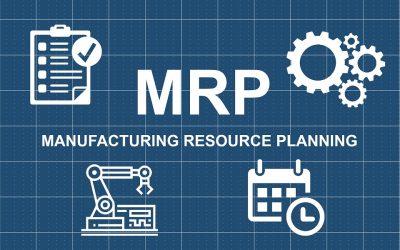In the complex landscape of modern manufacturing, optimizing production efficiency is crucial for maintaining a competitive edge. Material Requirements Planning (MRP) plays a pivotal role in streamlining production processes, ensuring timely availability of materials, and minimizing inventory costs. In this article, we will delve into the fundamentals of MRP, explore the benefits of MRP assessments for manufacturers, and highlight how optimizing MRP can lead to significant improvements in production efficiency and overall business performance.
- Understanding Material Requirements Planning (MRP): 1.1. What is MRP? Material Requirements Planning (MRP) is a systematic approach used by manufacturers to manage and control the flow of materials needed for production. MRP calculates and plans the quantities and timings of materials required based on the production schedule, customer demand, and inventory levels.
1.2. Key Components of MRP: a) Bill of Materials (BOM): A comprehensive listing of all the raw materials, components, and sub-assemblies required to manufacture a product. b) Master Production Schedule (MPS): A detailed plan that outlines the production requirements and schedules for each item. c) Inventory Management: Monitoring and controlling the availability of raw materials and finished goods to ensure seamless production and minimize carrying costs. d) Material Planning and Procurement: Determining the quantities and timing of materials needed, considering lead times, supplier availability, and production schedules.
- Benefits of MRP Assessments for Manufacturers: 2.1. Improved Inventory Management: By accurately calculating material requirements, MRP assessments help manufacturers optimize inventory levels. This reduces excess stock, minimizes carrying costs, and prevents stockouts, ensuring materials are available when needed for production.
2.2. Enhanced Production Planning and Scheduling: MRP assessments provide manufacturers with a clear picture of the materials needed for production. This enables better production planning, scheduling, and resource allocation, resulting in improved production efficiency and on-time delivery.
2.3. Reduced Lead Times: Optimizing MRP through assessments helps streamline procurement processes, allowing manufacturers to reduce lead times. This minimizes delays in production and enhances overall operational efficiency.
2.4. Cost Savings: Efficient MRP systems, facilitated by regular assessments, help manufacturers optimize inventory, reduce waste, and minimize the costs associated with excess inventory and stockouts. This leads to substantial cost savings and improved profitability.
2.5. Demand Responsiveness: MRP assessments enable manufacturers to align production with customer demand. By accurately forecasting materials requirements and adjusting production schedules accordingly, manufacturers can ensure faster response times, meet customer deadlines, and enhance customer satisfaction.
- Optimizing MRP for Improved Efficiency: 3.1. Comprehensive Data Analysis: Conduct a detailed analysis of historical data, production schedules, and demand patterns to identify areas for improvement and fine-tune MRP parameters.
3.2. Integration with ERP Systems: Integrate MRP with an Enterprise Resource Planning (ERP) system to enhance data accuracy, enable real-time information sharing, and streamline communication across departments.
3.3. Automation and Technology Integration: Leverage automation and advanced technologies, such as Internet of Things (IoT) devices and machine learning algorithms, to optimize MRP processes, improve forecasting accuracy, and automate replenishment.
3.4. Collaboration and Communication: Facilitate seamless collaboration and communication between production, procurement, and sales teams to ensure accurate data input, alignment of production schedules, and proactive issue resolution.
3.5. Continuous Monitoring and Evaluation: Regularly monitor MRP performance, track key performance indicators (KPIs), and conduct periodic assessments to identify bottlenecks, evaluate the effectiveness of MRP strategies, and make necessary adjustments.
In conclusion Material Requirements Planning (MRP) assessments provide manufacturers with invaluable insights and tools to optimize production efficiency. By leveraging the power of MRP, manufacturers can streamline inventory management, enhance production planning, reduce lead times, and achieve significant cost savings. Embracing MRP assessments, along with continuous optimization efforts, empowers manufacturers to stay competitive, meet customer demands, and drive overall business success in the dynamic manufacturing landscape.
 TSVMap is committed to enhancing your manufacturing processes and providing expert consultation on your IT solutions, striving to maximize their effectiveness and efficiency. If you require assistance with…IT Solutions, Assessment, Consultants, ERP Systems, MRP Systems, Automations, or Cyber Security. Contact us today at 864-991-5656 or Email info@tsvmap.com
TSVMap is committed to enhancing your manufacturing processes and providing expert consultation on your IT solutions, striving to maximize their effectiveness and efficiency. If you require assistance with…IT Solutions, Assessment, Consultants, ERP Systems, MRP Systems, Automations, or Cyber Security. Contact us today at 864-991-5656 or Email info@tsvmap.com









0 Comments